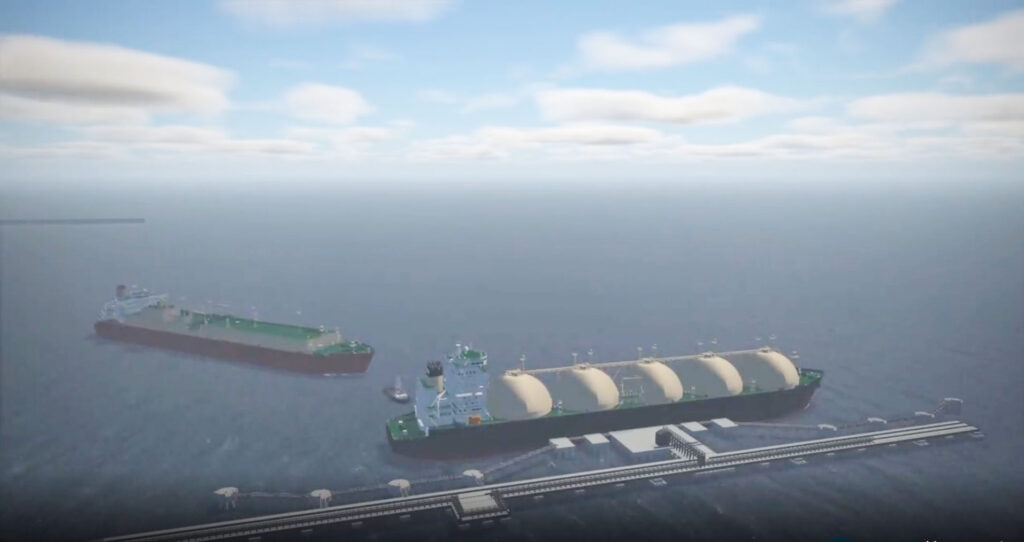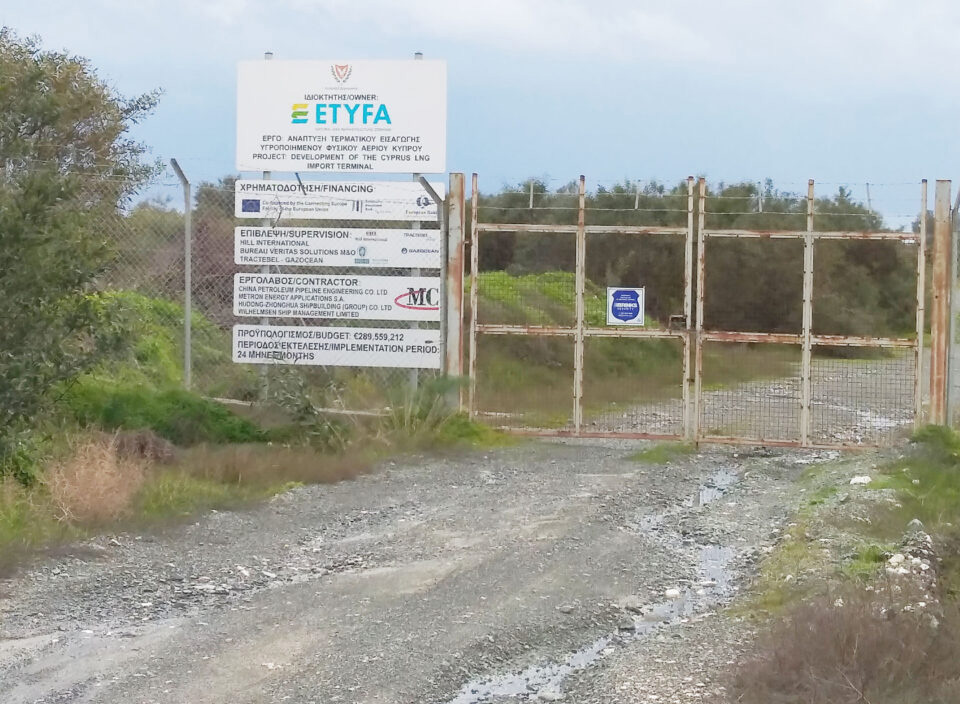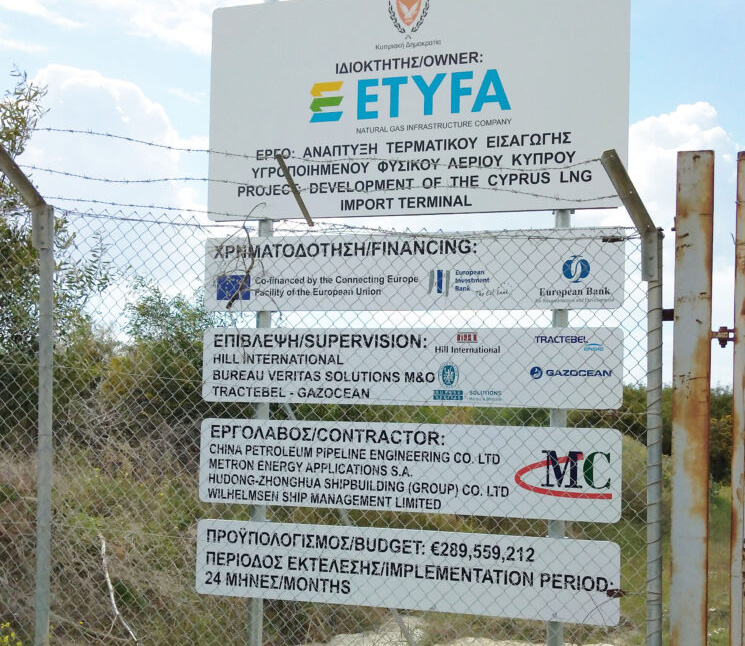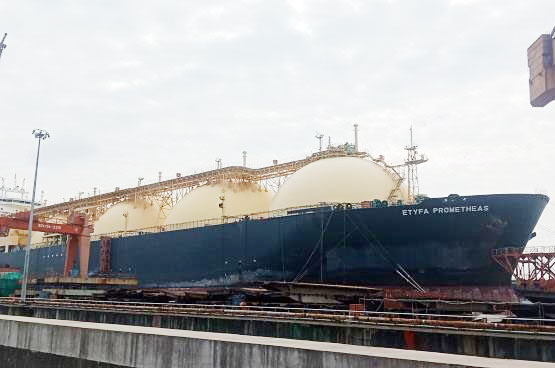More than two years after the contract signed to build a liquefied natural gas import terminal at the port of Vasilikos, the project is stuck at 4 per cent at most, sources tell the Sunday Mail. Meantime it seems the government has belatedly grasped the gravity of the problem, is scrambling to sort out its differences with the contractor.
President Nicos Anastasiades on Thursday urged the project be sped up, while on Friday a representative for the contractor issued a new completion date of July 2023, mainly blaming the pandemic and supply-chain issues for the delays. Apart from that, few others want to talk on the record.
In December 2019 Cyprus and a consortium led by China Petroleum Pipeline Engineering Co Ltd signed a contract for the construction of the nearly €300 million infrastructure for the import of LNG for electricity generation – a project dubbed the biggest ever in the field of energy in Cyprus.
The LNG terminal will include a floating storage and regasification unit (Fsru), a jetty for mooring the Fsru, a jetty-borne gas pipeline and related infrastructure.
The project has secured a €101 million grant from the EU under the Connecting Europe Facility (CEF) financial instrument. The rest of the financing comes from the European Investment Bank and the European Bank for Reconstruction and Development.
But industry sources have told us that neither the project owner (Etyfa, the subsidiary of Defa, the natural gas public company), nor their advisors Hill International, nor even the contractor China Petroleum are up to the task of managing an LNG project of this scale or complexity.
Our sources say the only involved company that has any experience is Tractebel, but they are only subcontractors who review and approve or reject drawings under the auspices of Hill.
The Sunday Mail understands that problems began from the outset with the Epcoma (Engineering, Procurement, Construction, Management) contract for the project. As drafted, and considering the parties involved, the contract was “impossible to fulfill,” said one source.
For example, the Epcoma included the specification that the jetty must be designed to allow for the transportation of regasified LNG in a pipeline from the floating unit to the shore. This is standard. But the contract also states that the jetty must be capable of bunkering LNG for vessels that use LNG as fuel.
According to a source with technical savvy, this threw a spanner in the works as all of a sudden it raised many safety considerations – since the prime fuel supply jetty for the island will be used as a gas station as well.
The problem lies in that the contractor lacks experience in building LNG facilities of any sort, let alone operating one as a gas station as well as a regasification facility.
The requirement to use the jetty for exporting LNG was described as “probably the biggest showstopper.”
Piping liquid gas to the jetty and onboard an LNG carrier would require extremely low temperatures, meaning the thermal characteristics of this pipeline exert enormous stresses on the jetty.
Moreover, once the jetty is destined for cryogenic transport use inside the EU, it must satisfy certain requirements, known at the BS EN 1473 design code and its seismic requirements.
This means that the closer the jetty is to the bedrock the better, as the piles have to be driven into solid material.
However, the geophysical test drilling that should have been done years ago and way before the tender to build the facility was published, was never carried out.
The Epcoma states the contractor has to carry out their own geophysical survey to confirm a jetty can be built that can handle these requirements.
But it’s understood that, between the awarding of the contract in December 2019 and the project’s kick-off meeting in September 2020, absolutely nothing was done with regard to the deliverable requirements of the contract. It was only when the contractor was pressed that they carried out the geophysical survey in the first quarter of 2021.
However, the findings of the geophysical survey raised design issues when applying BS EN 1473, as the substrate at varying wavelength ranges could cause the substrate to turn into a liquid state and the piles that support the jetty would probably sink into the liquid material causing the jetty to collapse.
In short, the dual use envisaged for the jetty complicates matters by orders of magnitude.
The Sunday Mail understands that when contractor China Petroleum Pipeline Engineering signed the contract, they had no jetty design capability, no cryogenic pipeline experience and had never heard of BS EN 1473. Neither had Defa/Etyfa.
By now, the jetty should been piled and there should be at least 50-65 per cent progress – but there’s nothing there. In fact, the jetty hasn’t even been designed.
Meantime the contractor has hired and fired at least four subcontractors to date.
The absence of any substantial work on the jetty is startling, as it comes 16-17 months into a 24-month project.
Long delays are also affecting the onshore facility.
The facility requires a number of reasonably large (24-inch diameter) automated valves and actuators for emergency shutdown use and usually take between 12 and 18 months delivery, once the order is placed. However, before the order is placed, a datasheet needs to be produced stating what the material and pressure requirements are for the valve that includes all of the specifications that it must be made to. This document then gets attached to a RFQ (Request for Quotation) or ITB (Invitation to Bid).
The Sunday Mail learns that the datasheets haven’t even been produced for these valves so progress on critical items like this is nil.
Likewise, none of the onshore facilities have had datasheets produced and signed off on.
Then there is the Fsru (the vessel), where it has just been announced that some plate has been cut.
The Fsru was originally planned to be here around June/July 2022 for early commissioning. The original plan was to have all of the regasification equipment installed by February, tested in March, pre commissioned in April/May and sailed here in June /July.
No regasification equipment has been installed on the vessel to date.
The vessel is in the Yangtze river at the moment. It’s supposed to be in dry dock having regasification equipment installed.
The latest tentative deadline for project completion is mid-2023. Overly ambitious? One anecdote – though trivial in the grander scheme of things concerns the asphalt road supposed to be built leading into the Vasilikos LNG complex. To this day, there is nothing there – only a dirt road and a sign posted outside the gate listing the engineers.
We reached out to the contractor, putting these questions to them and more- such as how much money has been paid to them to date. and whether there is truth to reports that they are currently seeking to renegotiate the contract with the Cyprus government.
An emailed response from the Chinese-led consortium read: “The project progress has been posted by the Minister of Energy, Commerce and Industry on 2 February 2022. There is currently no further information to provide.” A representative for the company spoke to the Cyprus News Agency on Friday, however setting out their take on the delays.
We next contacted both the energy ministry and Etyfa, raising these matters with them. Likewise we asked how much money has been paid to date to the contractor as well as to the government advisors, Hill International. Again, the responses were terse.
Energy Minister Natasa Pilides declined commenting on specific issues, referring us to the statement issued by President Anastasiades on January 23 following a meeting with the new Defa chairman. She stated: “Regarding the progress of the project, which is being very closely followed by both the ministry and Defa, Defa will be issuing new announcements as and when relevant/necessary. In any case, we assure you that all necessary measures are being taken to protect the interests of the Republic of Cyprus and to ensure the expeditious and efficient completion of the project.”
Likewise, replying via email Etyfa said: “Taking into account that your questions relate to an agreement with a third party, and in order to protect the public interest and to safeguard the rights of the Republic, any additional comment is not considered appropriate at this time.”
The Sunday Mail meanwhile understands that the contractor has asked for an amendment to the original contract.
Other local media have since picked up on this. On Friday daily Phileleftheros reported that the contractor seeks an extra €100m to cover the rising cost of materials (steel and so forth).
The news trickled out after Thursday’s palace meeting when Anastasiades urged all involved government departments to see how they might expedite the project.
According to Phileleftheros, following talks with the government the contractor has since agreed to lower their demands from €100 million to €25 million. The paper said the government is caught between a rock and a hard place – either cave in to the contractors’ additional demands or else cancel the contract, leaving Cyprus without an LNG facility and thus continuing to pay millions a year in greenhouse gas allowances.
Even in the best-case scenario, where the two parties agreed to amend the original contract, the amendments would still need the nod from the Central Committee on Changes and Claims – the top state organ that reviews changes and claims on public procurement contracts.
CPPE rep: Difficult to understand the reasons for the criticisms

How the LNG terminal area is to look on completion of the project according to an artist’s impression
By Gina Agapiou
The completion of LNG terminal was delayed mainly due to the coronavirus pandemic which has also increased material costs and caused delivery delays, the company awarded the contract said this week.
Work to build the LNG terminal at Vasiliko is expected to start around the end of February with a view to delivering the multi-million-euro project by July 2023, the Cyprus News Agency reported, quoting Giorgos Christou, a representative of the China Petroleum Pipeline company awarded the contract.
He said the revised time plan for delivery in July 2023 will be adhered to, with every effort made to improve on it.
The project was initially due to have been completed at the end of 2022.
EPC (engineering, procurement, and construction) executive manager Christou told the news agency that 90 per cent of the basic planning has been concluded and permits obtained for work to start.
He said there was a consensus and desire from all sides for work to proceed quickly to make up for lost time as a result of the pandemic.
The contract for the project, he said, was awarded in December 2019, right before the pandemic outbreak.
“Nevertheless, the project could not start as the financing from the European Banks was pending and the Notice to Proceed was issued in May 2020,” he said.
Christou added that pending the selection of the owner’s engineer, the commencement date of the project was set for September 28, 2020, amid the peak of the pandemic.
“This period has been described as one of the most difficult ever in the global market, in that no one has been able to plan and predict the next day with certainty.”
“Many major projects worldwide have been cancelled and several have had to be redefined in terms of their viability,” he said, explaining “the cost and delivery time of raw materials and equipment has skyrocketed, with no one being able to commit or guarantee the final delivery”.
Despite the increases recorded, EPC, “with its experience and size, has managed to secure the raw materials and equipment required for the project, keeping prices and delivery times at manageable levels,” he added.
Regarding the Etyfa Prometheas, which is the largest and most complex part of the project, he said that work, at Cosco’s Shanghai shipyard, is in full swing.
“At the present time, the two most vital units, the regasification unit (Regas) and the power module (Power Module) are under construction,” he said, noting that upon completion of these works, the ship will be converted, from a simple LNG carrier (LNGC), to a floating storage and regasification unit (FSRU), while fully retaining its original functions as a merchant ship.
“The work is indeed time-consuming, as it involves transporting a lot of materials and equipment from remote places such as Europe, facing huge delays due to pending issues in the global transportation chain,” Christou added.
Responding to the various criticisms that have been levelled at the project, Christou said the importance of this project is undeniable and its benefits are significant on multiple levels and that it is difficult to understand the reasons for any criticisms.
“With regard to the benefits, I will refer indicatively to the geopolitical upgrading of Cyprus’ position, the energy autonomy it will gain, the improvement of its ecological footprint, with a reduction of pollutants, the savings of tens of millions of euros per year (from the sanctions currently imposed by the EU), and even the reduction of the risk of pollution in the region, as tankers will no longer deliver heavy fuel oil,” he said.
He added that apart from the supply of equipment, through local agents and the involvement of contractors and human resources for the implementation of the works, there will be a significant transfer of know-how, contributing to the plans to upgrade the island to an energy hub in the Eastern Mediterranean.
In the context of the above, he said “it is difficult to understand the reasons for the possible criticisms,” especially since the project is mostly funded by the EU and was awarded through an International Tender, under the detailed supervision of the Cypriot authorities and European institutions.
According to Christou, the consortium that undertook the project holds a leading position in the global market, having constructed 15 port facilities and over 120,000 km of pipelines in recent years.
“The Cypriot government, with the completion of this project, will now have full ownership and operation of an integrated facility, with the additional ability to provide other services such as LNG refuelling and possible LNG exports,” he said.
You may also want to read: Radical new choices may be needed for LNG imports









Click here to change your cookie preferences